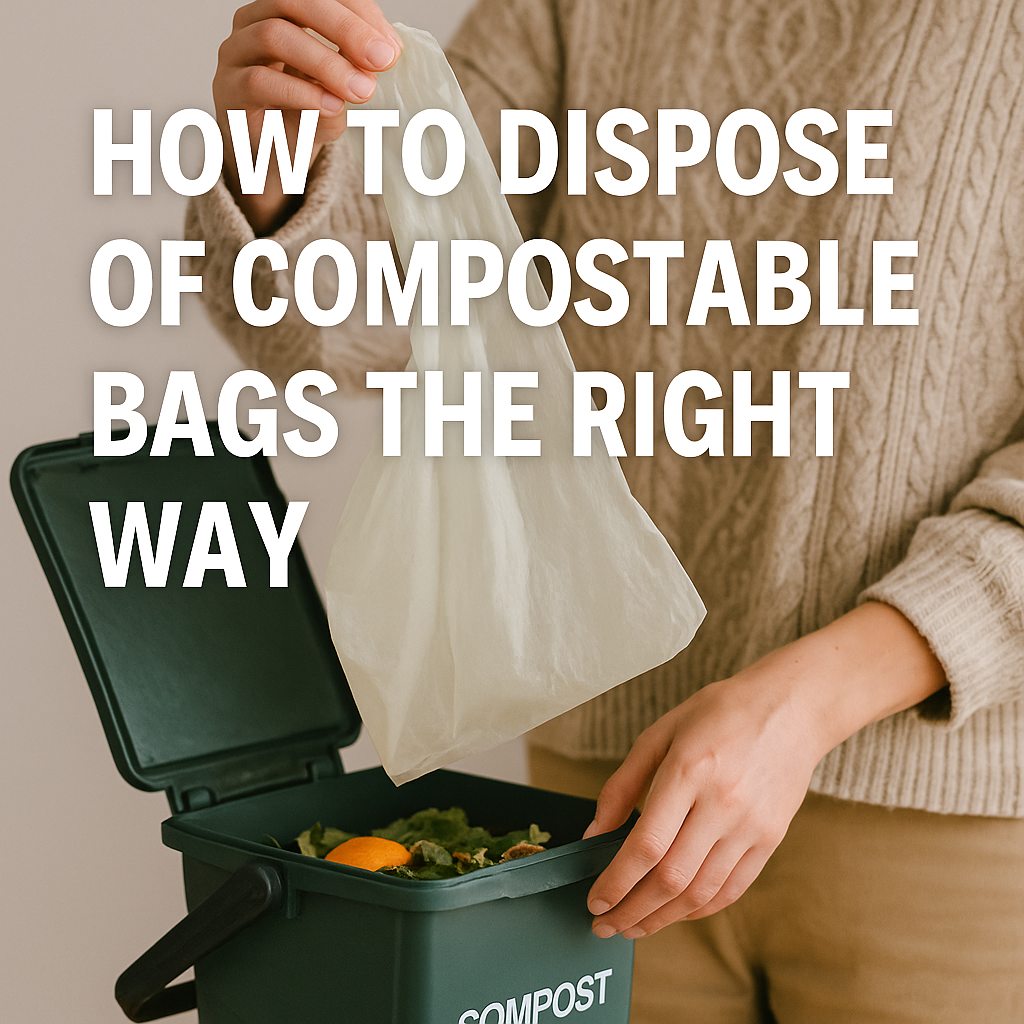You’ve made the switch to compostable bags — a great step toward sustainability. But are you disposing of them correctly?
Many people assume that compostable equals “harmless in any bin,” but that’s not the case. Without proper disposal, compostable bags can end up doing more harm than good.
In this guide, we’ll break down exactly how to dispose of compostable bags properly — whether you’re a consumer, a business, or an eco-conscious brand looking to make a real impact.
Compostable vs. Biodegradable: Know the Difference
Before diving into disposal, let’s clarify a common misconception:
- Compostable bags break down into natural materials under specific composting conditions — like heat, moisture, and oxygen.
- Biodegradable bags simply break down over time — sometimes slowly, sometimes incompletely — and often leave behind microplastics.
So, compostable bags aren’t a “toss it anywhere” solution. They need the right environment to truly return to nature.

Why Proper Disposal Matters
Throwing a compostable bag into the trash may seem harmless, but in a landfill, it won’t compost. Instead, it may sit for years — just like regular plastic. Proper disposal ensures:
- Reduced landfill waste
- Fewer greenhouse gases
- Maximized environmental benefits of compostable packaging
How to Dispose of Compostable Bags
There are three main ways to dispose of compostable bags properly:
1. Home Composting
If your compostable bags are certified home compostable, you can compost them in your backyard system.
Setting Up Your Compost
- Use a bin or pile in a shaded, well-ventilated area.
- Maintain a balance of greens (food scraps, coffee grounds) and browns (leaves, paper, compostable bags).
- Keep the pile moist (like a wrung-out sponge) and turn it weekly to let oxygen in.
- Compostable bags often take longer than food waste, so shred them if possible.
Avoid composting:
- Non-home-compostable bags (check for certification)
- Pet waste bags (unless specified)
- Bags with plastic linings
2. Industrial Composting
Most compostable bags are designed for industrial composting, which uses high heat and controlled conditions to break down materials faster.
You can:
- Drop off bags at a certified composting facility
- Use a commercial compost collection service (check your city’s waste program)
- Partner with industrial composters as a business
Tip: Always look for certifications like EN13432, ASTM D6400, or OK Compost Industrial to ensure your bags qualify.
3. Curbside Compost Pickup (If Available)
Many cities offer compost collection bins for food and compostable packaging. Simply place your certified compostable bags in the bin, and they’ll be sent to a commercial facility.
Not available everywhere? Consider lobbying your local council for better composting infrastructure.
What Not To Do
❌ Don’t throw compostable bags in the regular trash
❌ Don’t recycle them with plastic (they contaminate recycling streams)
❌ Don’t compost bags that aren’t clearly certified
Why Businesses Should Care
If your brand uses compostable packaging, it’s essential to guide customers on how to dispose of it. Why?
- ✅ Eco-Credibility: Customers trust brands that walk the talk
- ✅ Customer Loyalty: People return to brands that align with their values
- ✅ Cost Savings: Diverting waste from landfills often lowers disposal fees
- ✅ Compliance: Many regions are tightening rules around packaging waste
Educating your customers can turn a compostable product into a complete circular solution.
Debunking Common Myths
- Myth 1: All “bio” bags are the same
False. Compostable and biodegradable are not interchangeable. Only compostable bags fully break down into non-toxic materials. - Myth 2: Compostable bags break down anywhere
Not true. They require heat, oxygen, and moisture — which landfills don’t provide. - Myth 3: Home composting is hard
It’s easier than you think. With a bit of setup and regular turning, your food scraps and bags become rich compost for your plants.
Looking Ahead: The Future of Compostable Packaging
- 🌱 More compostable materials are being developed that work in both home and industrial settings.
- 🏭 Composting infrastructure is expanding globally — with cities and businesses investing in greener waste systems.
- 📦 Brands are switching from traditional plastic to compostable solutions to meet sustainability goals and customer expectations.
Final Thoughts
Compostable bags are only part of the solution — how we dispose of them matters just as much.
Whether you’re a consumer or a business, understanding and promoting proper disposal practices can make a real difference. Every composted bag keeps waste out of landfills and supports a cleaner, greener planet.
Ready to Make an Impact?
At Hemcbags, we’re committed to helping businesses and distributors transition to truly sustainable packaging.
We provide certified compostable bags — and the knowledge to use them effectively.
👉 Explore our wholesale compostable bags and start your zero-waste journey today.

